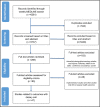High sodium intake increases blood pressure and risk of kidney disease. From the Science of Salt: A regularly updated systematic review of salt and health outcomes (August 2016 to March 2017)
- PMID: 30402970
- PMCID: PMC8030856
- DOI: 10.1111/jch.13408
High sodium intake increases blood pressure and risk of kidney disease. From the Science of Salt: A regularly updated systematic review of salt and health outcomes (August 2016 to March 2017)
Abstract
The purpose of this review was to identify, summarize, and critically appraise studies on dietary salt and health outcomes that were published from August 2016 to March 2017. The search strategy was adapted from a previous systematic review on dietary salt and health. Studies that meet standards for methodological quality criteria and eligible health outcomes are reported in detailed critical appraisals. Overall, 47 studies were identified and are summarized in this review. Two studies assessed all-cause or disease-specific mortality outcomes, eight studies assessed morbidity reduction-related outcomes, three studies assessed outcomes related to symptoms/quality of life/functional status, 25 studies assessed blood pressure (BP) outcomes and other clinically relevant surrogate outcomes, and nine studies assessed physiologic surrogate outcomes. Eight of these studies met the criteria for outcomes and methodological quality and underwent detailed critical appraisals and commentary. Five of these studies found adverse effects of salt intake on health outcomes (BP; death due to kidney disease and initiation of dialysis; total kidney volume and composite of kidney function; composite of cardiovascular disease (CVD) events including, and risk of mortality); one study reported the benefits of salt restriction in chronic BP and two studies reported neutral results (BP and risk of CKD). Overall, these articles confirm the negative effects of excessive sodium intake on health outcomes.
©2018 Wiley Periodicals, Inc.
Conflict of interest statement
NRCC was a paid consultant to the Novartis Foundation (2016‐2017) to support their program to improve hypertension control in low‐ to middle‐income countries which include travel support for site visits and a contract to develop a survey. NRCC has provided paid consultative advice on accurate blood pressure assessment to Midway Corporation (2017) and is an unpaid member of World Action on Salt and Health (WASH). JW is Director of the World Health Organization Collaborating Centre on Salt Reduction and receives funding for work on salt reduction from the World Health Organization, the National Health and Medical Research Council, The Victorian Health Promotion Foundation. DM, KSP, KT, JA, and AAL have no conflict of interest to declare. MMYW is a research consultant with Renal Research Institute and Arbor Research Collaborative for Health.
Figures
References
-
- Institute of Medicine, Food and Nutrition Board . Dietary Reference Intakes for Water, Potassium, Sodium, Chloride, and Sulfate. Washington, DC: National Academy Press, 2005.
-
- WHO . Guideline: Sodium intake for adults and children. Geneva: WHO; 2012.http://apps.who.int/iris/bitstream/handle/10665/77985/9789241504836_eng..... Accessed February 02, 2018. - PubMed
-
- World Health Orginization . Report of the Formal Meeting of Member States to conclude the work on the comprehensive global monitoring framework, including indicators, and a set of voluntary global targets for the prevention and control of noncommunicable diseases. Geneva, Switzerland: World Health Orginization;2012.
Publication types
MeSH terms
Substances
LinkOut - more resources
Full Text Sources
Medical
Miscellaneous


